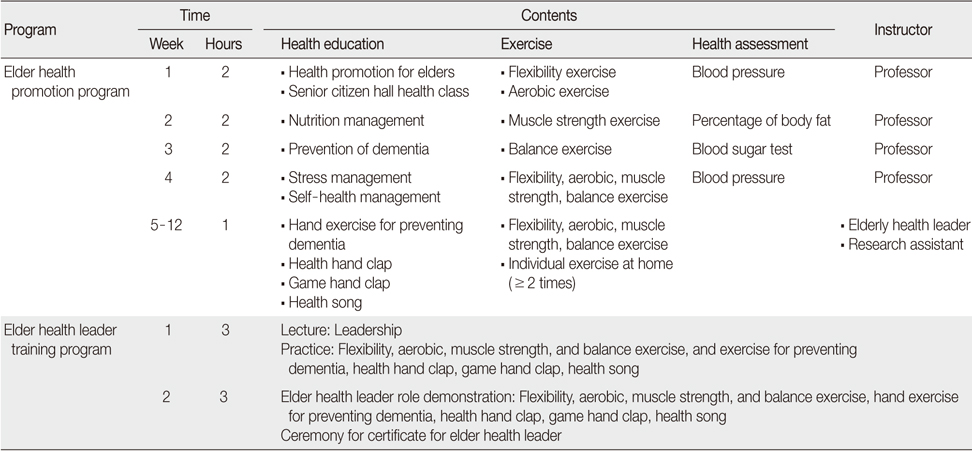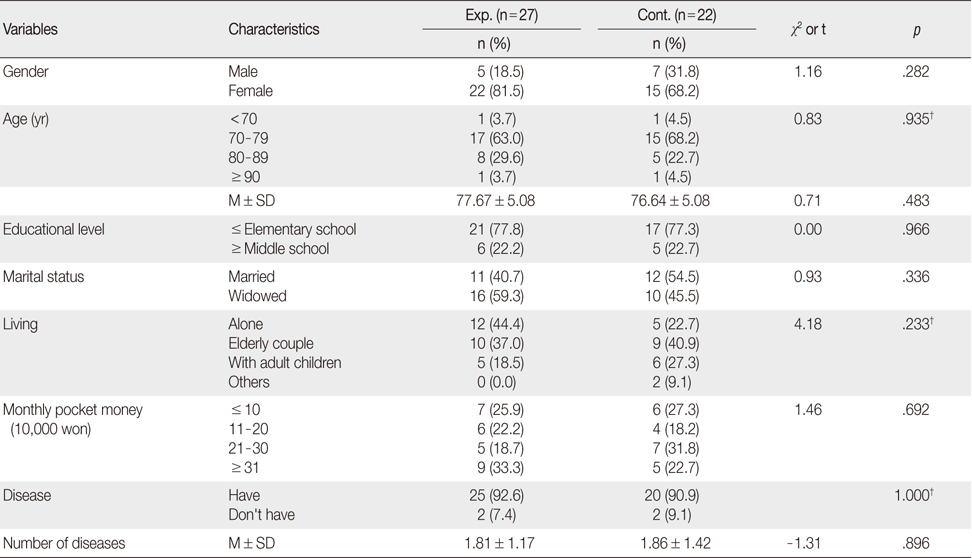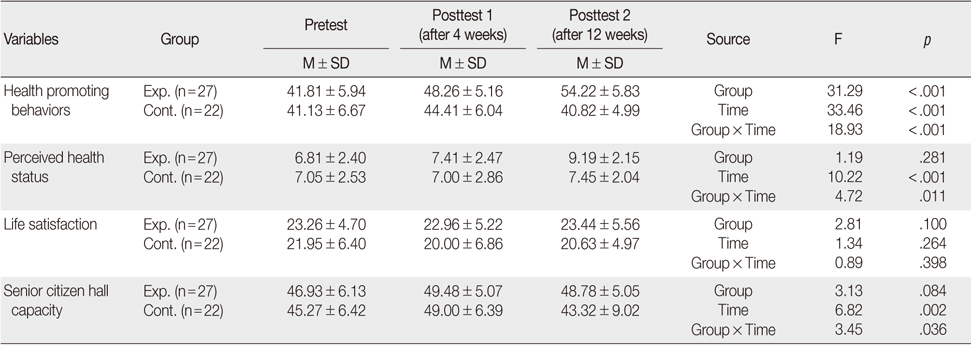Articles
- Page Path
- HOME > J Korean Acad Nurs > Volume 42(1); 2012 > Article
-
Original Article
- Effects of an Elder Health Promotion Program using the Strategy of Elder Health Leader Training in Senior Citizen Halls
- Mee Ock Gu, Young Eun, Eun Sim Kim, Hwang Ran Ahn, In Soo Kwon, Hyun Sook Oh, Young-Sil Kang, Myun Sook Jung, So Young Choi, Kyung Mi Sung, Hye Yeon Kang
-
Journal of Korean Academy of Nursing 2012;42(1):125-135.
DOI: https://doi.org/10.4040/jkan.2012.42.1.125
Published online: February 29, 2012
1Professor, College of Nursing, Gerontological Health Research Center, Institute of Health Sciences, Gyeongsang National University, JinJu, Korea.
2Associate Professor, College of Nursing, Gerontological Health Research Center, Institute of Health Sciences, Gyeongsang National University, JinJu, Korea.
3Assitant Professor, College of Nursing, Gerontological Health Research Center, Institute of Health Sciences, Gyeongsang National University, JinJu, Korea.
4Doctoral student, College of Nursing, Gyeongsang National University, JinJu, Korea.
- Address reprint requests to: Eun, Young. College of Nursing, Gerontological Health Research Center, Institute of Health Sciences, Gyeongsang National University, 92 Chilam-dong, JinJu 660-751, Korea. Tel: +82-55-772-8233, Fax: +82-55-772-8209, yyoeun@gnu.ac.kr
© 2012 Korean Society of Nursing Science
- 1,134 Views
- 2 Download
- 11 Crossref
Figure & Data
REFERENCES
Citations

- Effects of Integrated Dementia Managing Programme for the Elderly with Mild Dementia in Nursing Home
Meung Sook Ahn, Hyun Sook Jo
Journal of Korean Academy of Community Health Nursing.2019; 30(4): 550. CrossRef - The Effects of a Health Mentoring Program in Community-dwelling Vulnerable Elderly Individuals with Diabetes
Ki wol Sung, Hye Seung Kang, Ji Ran Nam, Mi Kyung Park, Ji Hyeon Park
Journal of Korean Academy of Nursing.2018; 48(2): 182. CrossRef - Effects of a Health Promotion Empowerment Program Using a Resident Volunteer as a Lay Health Leader on Frail Elders' Health and Empowerment
Jeong Sook Park, Yun Jung Oh
Journal of Korean Academy of Community Health Nursing.2018; 29(3): 335. CrossRef - Effects of Peer Mentoring Program on the Health Conservation in Elderly Women with Osteoarthritis
Jiran Nam, Kiwol Sung
Journal of Korean Academy of Community Health Nursing.2017; 28(3): 227. CrossRef - Effects of Exercise Program for Women of Old-Old Age in Senior Citizen Halls based on Pender's Health Promotion Model
Kyoung Im Lee, Young Eun
Journal of muscle and joint health.2016; 23(2): 71. CrossRef - Analysis on Characteristics of Indoor Environment and Satisfaction Level of Users of Senior Centers in Jeonju Residential Areas
Insoo Jeoong, Xiangwei Meng
Journal of the Korean Housing Association.2016; 27(6): 31. CrossRef - Factors Influencing Physical Activity in Elderly Women at Senior Citizen Centers
Kyung Hee Seo, Young Eun
Journal of muscle and joint health.2015; 22(3): 236. CrossRef - Developing a Community Capacity Builded Exercise Maintenance Program for Frail Elderly Women
Yeon Hee Choi, Sun Yi Hong
The Korean Journal of Rehabilitation Nursing.2015; 18(2): 153. CrossRef - A Comparative Study on Influencing Factors of Health Related Quality of Life of the Elderly in Senior Center by Region : Focus on Urban and Rural Areas
Soon-Ok Yang, Hae-Ryun Cho, Seung-Hee Lee
The Journal of Digital Policy and Management.2014; 12(1): 501. CrossRef - The Relationships between Social Determinants of Health and Health-related Quality of Life among the Community-dwelling Elderly
Junghee Kim, Hyeonkyeong Lee, Chung Yul Lee, Eunhee Cho
Journal of Korean Academy of Community Health Nursing.2014; 25(4): 237. CrossRef - The Effects of an Exercise Program using a Resident Volunteer as a Lay Health Leader for Elders' Physical Fitness, Cognitive Function, Depression, and Quality of Life
Yeon-Hee Choi, Na-Young Kim
Journal of Korean Academy of Community Health Nursing.2013; 24(3): 346. CrossRef
Elder Health Promotion Program and Elder Health Leader Training
Homogeneity Test of General Characteristics between Experimental and Control Groups (N=49)
†Fisher's exact test.
Exp.=Experimental group; Cont.=Control group.
Homogeneity Test of Dependent Variables between Experimental and Control Groups (N=49)
Exp.=Experimental group; Cont.=Control group.
Effects of Program on Health Promoting Behaviors, Perceived Health Status, Life Satisfaction, Senior Citizen Hall Capacity (N=49)
Exp.=Experimental group; Cont.=Control group.
Effects of Program on Physical Fitness (N=49)
Exp.=Experimental group; Cont.=Control group.
†Fisher's exact test. Exp.=Experimental group; Cont.=Control group.
Exp.=Experimental group; Cont.=Control group.
Exp.=Experimental group; Cont.=Control group.
Exp.=Experimental group; Cont.=Control group.
 KSNS
KSNS
 E-SUBMISSION
E-SUBMISSION





 Cite
Cite

